|
|
|
Sort Order |
|
|
|
Items / Page
|
|
|
|
|
|
|
| Srl | Item |
| 1 |
ID:
146738
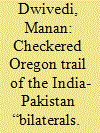

|
|
|
|
|
| Summary/Abstract |
The paper provides a historical analysis of the pantheon of years and landmark developments and trail blazing iconic events as they subsumed the American foreign policy since the creation of free nations such as India and Pakistan in South Asia. The delineation of the India-Pakistan’s troubled relationship is not a difficult ask but the extraneous influence of great powers such as United States of America in an increasingly multi polar nature of the international system makes the deft balancing act of Washington, a challenging diplomatic and strategic exercise. Pakistan is a trusted and traditional ally while India has criss-crossed the pathways of “ Allyhood” with its divergent policy responses to Washington’s national interested defined Foreign Policy in South Asia.
|
|
|
|
|
|
|
|
|
|
|
|
|
|
|
|
| 2 |
ID:
146748
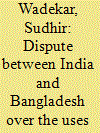

|
|
|
|
|
| Summary/Abstract |
The Ganges River is very important for India, particularly for Uttar Pradesh, Bihar and West Bengal. The Farakka Barrage was built for the main purpose of flushing out the silt of Bhagirathi-Hoogly River, through it ships can navigate from Bay of Bengal to Calcutta. Initially Pakistan raised question on the Farakka Barrage. After the emergence of Bangladesh, the Ganges water dispute becomes an important issue between India and Bangladesh. Bangladesh tried to internationalize the water sharing issue.
|
|
|
|
|
|
|
|
|
|
|
|
|
|
|
|
| 3 |
ID:
146733
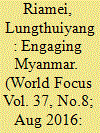

|
|
|
|
|
| Summary/Abstract |
A country’s foreignpolicy comprises of self-interest strategies chosen by the state to safeguard its national interests and to achieve its goals within international relations.The approaches are strategically employed to interact with other countries. In other words, the foreign policy of a country is the sum total of the principles, interests, and objectives which it seeks to promote through its relations with other countries. It is also for influencing and changing the behavior of other states and for adjusting its own activities to the international environment. So the conduct and formulation of foreign policy is governed by the interplay of numerous determinants, institutions, processes and personalities.
|
|
|
|
|
|
|
|
|
|
|
|
|
|
|
|
| 4 |
ID:
146741
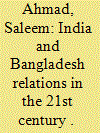

|
|
|
|
|
| Summary/Abstract |
In a nut shell, India and Bangladesh relations have developed rapidly in the 21st century in general and in particularly during the NDA led government under the leadership of the PM Modi who gave a new dimension to the relations between the two countries. But it should be noted that the Prime Minister Sheikh Hasina, the leader of Awami League, has shown similar enthusiasm, like PM Modi, to develop India and Bangladesh relations in a same manner. Both the leaders know very well the strength and weakness of their country, and they have realized the need of each other to maintain peace, prosperity and security in the South Asia region.
|
|
|
|
|
|
|
|
|
|
|
|
|
|
|
|
| 5 |
ID:
146732


|
|
|
|
|
| Summary/Abstract |
Indeed, friendly relations with neighbours are of paramount importance for all countries as that determine a country’s stature and standing not only among its neighbours but also in the world. Obviously, India’s emergence as a regional power and a respected global player depends on its meaningful position in South Asia. Fortunately, the new Indian government under Narendra Modi has taken all-out steps towards forging closer ties with all of its neighbours with a view to establish a strong and effective regional bulwark with their participation and cooperation for ensuring overall progress of the region and also to remove their age-old apprehension about India’s big-brotherly role aim at maintaining its predominance in South Asia.
|
|
|
|
|
|
|
|
|
|
|
|
|
|
|
|
| 6 |
ID:
146740


|
|
|
|
|
| Summary/Abstract |
India’s bilateral relations with small island state of Maldives have many ups and downs in recent years. Maldives would be struggling with the adverse consequences of climate change and seeking closer ties with India to manage them. India should assist Maldives as comprehensively as possible. The region can progress if the countries of the region create interdependencies and cooperate with each other to tackle common challenges. India will need a stronger articulation of its vision South Asia. India cannot aspire to be a truly convincing great power until it achieves a better handle on its region particularly with small island state of Maldives.
|
|
|
|
|
|
|
|
|
|
|
|
|
|
|
|
| 7 |
ID:
146744


|
|
|
|
|
| Summary/Abstract |
The Indo-Pakistan conflict is the direct consequence of the imbalance of power between the two states and Pakistani non-acceptance of this imbalance. India has always looked upon Pakistan as a sovereign state and has conducted its relations accordingly. It would be an ideal solution if both India and Pakistan could sort out their differences diplomatically and if pressure from the International community as well as Indian / Chinese influence could scale back the military – jihadi elite and promote genuine democracy in the country. This could lead Pakistan to become another Turkey / Germany or Japan in the region and bringing in prosperity to the area. But according to Neo-realists, the gross imbalance between India and Pakistan and Pakistani attempts to balance Indian strength rather than bandwagon it, will not allow any entente to emerge between the two countries.
|
|
|
|
|
|
|
|
|
|
|
|
|
|
|
|
| 8 |
ID:
146735
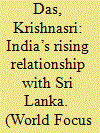

|
|
|
|
|
| Summary/Abstract |
A peaceful and prosperous Sri Lanka would always be in India’s strategic interest. Sri Lanka is significant for India as it is the latter’s closest maritime neighbor. Last but not the least India adopts a pro active policy towards Sri Lanka, in order to not only save the people but also for its own security reasons. India’s own growing economic interests in Sri Lanka have also tempered its political activism. In times of crisis, whether political, military, or international, Sri Lanka has generally taken India into confidence for consultation and advice.
|
|
|
|
|
|
|
|
|
|
|
|
|
|
|
|
| 9 |
ID:
146743


|
|
|
|
|
| Summary/Abstract |
Indo-Myanmar relations have suffered through willful negligence in the past. But we should not forget the present that goes back to at least a generation. It indicated that the relationship has been moving towards an upward trend and has experienced a positive peak in the last 4 years. It gained peak during the Manmohan Singh Government and has again gathered momentum during the time of Prime Minister Narendra Modi. There is a national consensus now in India on Indo - Myanmar policy but the future relations will depend on the domestic developments within Myanmar. What happens to Myanmar is important to India and the neighbors of Myanmar.
|
|
|
|
|
|
|
|
|
|
|
|
|
|
|
|
| 10 |
ID:
146734


|
|
|
|
|
| Summary/Abstract |
With the NDA-II Government’s assumption of office in May 2014, its “Neighbourhood First” policy had indeed provided a niche to Nepal, as borne out by the priority accorded to it through a series of high-level visits/engagements initiated by the Minister of External Affairs and the Prime Minister of India. Unfortunately, this optimistic rhythm received a major jolt by mid-2015, with the deteriorating curve of bilateral ties becoming apparent by the year end. Thus, in October 2015, when the ethnic Madhesis blockaded the Indo-Nepal border for over five months, crippling the economic backbone of the landlocked state, Kathmandu was quick to term the standoff as an “unofficial blockade” by India, alleging New Delhi’s tacit support for the Madhesis.
|
|
|
|
|
|
|
|
|
|
|
|
|
|
|
|
| 11 |
ID:
146749


|
|
|
|
|
| Summary/Abstract |
India and China are two major Asian powers, vying for a dominant geo-strategic space & say in world affairs, owing largely to their respective sizes of population, area and economic clout. Both the countries are members of BRICS, an association of developing or newly industrialised nations which are distinguished by their large and fast growing economies with significant influence on regional and global affairs. China is also one of the five permanent members of the United Nations Security Council. Since Independence, India’s China policy has witnessed a number of highs and lows in their relations, the hallmark being the boundary and territorial disputes.
|
|
|
|
|
|
|
|
|
|
|
|
|
|
|
|
| 12 |
ID:
146747


|
|
|
|
|
| Summary/Abstract |
We can choose our friends, but not our neighbours, so the old saying goes. It is also said that we can change our history but not geography. We cannot unmake it. Fostering good political, social, economic and cultural ties with the neighbours occupy the central place in the arena of diplomacy and foreign policy making and India is not exception to it. Here in India, our foreign policy makers believe that peace, safety, security, stability and overall prosperity in the neighbourhood is sine quo non for the overall development not only of India but also of region as a whole. Needless to say, every right thinking Indian believes that peaceful and prosperous neighbourhood will enable us to focus our energies solely on the foremost goal of socio-economic development of our country and her people.
|
|
|
|
|
|
|
|
|
|
|
|
|
|
|
|
| 13 |
ID:
146745
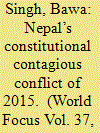

|
|
|
|
|
| Summary/Abstract |
Nepal has been undergoing a swift and unparalleled transformation in the political arena on account of factors like absence of unity among political parties, inadequate political participation for minority and ethnic people, economic weakness and vested interests of regional and external powers in the country's stability. Since 1950, Nepal has seen six constitutions and last one was promulgated on September 20, 2015 after the seven years grueling efforts of Constituent Assembly-1 and Constituent Assembly-II (2008-2015). The scholars, analysts, politicians of Nepal have been considering it as a very progressive and inclusive document. However, it has proved more contentious and controversial as the one-third Nepalese population (Madheshi people), who perceived it as discriminatory and exclusive one. It has created political paralysis in Nepal creating a lot of contagion effects of cold and cough for India as well.
|
|
|
|
|
|
|
|
|
|
|
|
|
|
|
|
|
|
|
|
|